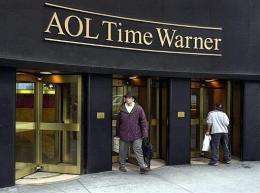Time Warner to spin off AOL, ending ill-fated deal

(AP) -- Time Warner Inc. is dumping AOL after spending nearly a decade trying to build a new-age media empire only to wind up in a weaker position than when the marriage began.
The divorce, announced Thursday, will spin out AOL as a separate company run by former Google Inc. advertising executive Tim Armstrong. He was hired in March to try to restore the luster to a brand once known as America Online.
Although AOL has been eclipsed by Google and other Internet stars, Armstrong still can try to build on a wide-reaching online ad network as well as AOL's Web sites, which remain a relatively big draw.
Time Warner owns 95 percent of AOL and will buy out Google's 5 percent stake during the third quarter for an undisclosed amount. From there, AOL - which has about 7,000 employees - will be spun off into a separate publicly traded company around the end of the year.
"For AOL, becoming a standalone company will give it more focus and strategic flexibility," Time Warner's chief executive, Jeff Bewkes, said at Time Warner's annual shareholder meeting Thursday in New York.
Meanwhile, with AOL jettisoned, Time Warner will focus on movies, cable TV networks such as HBO and CNN, and publishing magazines such as Time, People and Sports Illustrated.
The $147 billion deal in which AOL bought Time Warner in 2001 epitomized the mind-boggling wealth created during the dot-com boom and quickly became one of the worst corporate combinations in history. In 2002 and 2003, Time Warner absorbed nearly $100 billion in charges to account for the rapidly diminishing value of the combined company. Time Warner even dropped AOL from its corporate name.
AOL once defined the Web for millions of people. But much of its original revenue came from providing dial-up access, a business that peaked for AOL in 2002 at 26.7 million subscribers, back when the company stuffed free trial CDs in magazines and mailboxes. The march of broadband ate away at the business, and AOL had just 6.3 million dial-up subscribers at the end of the last quarter.
The decline undercut one of the main premises for the AOL-Time Warner deal, which was that Time Warner's media content would be enhanced by AOL's Internet reach.
AOL responded to the trend by giving away most of its services, like e-mail, to drive traffic to its free, ad-supported Web sites. It also laid off thousands of employees to try to streamline.
But after a few strong quarters, ad growth slowed and then began declining. AOL's Platform-A business places ads on sites all over the Web, not just ones run by AOL. Yet that reach hasn't mattered enough: Both Yahoo and Google mine bigger profits from their advertising businesses.
Although AOL's operations make money, its operating profit of $150 million in the first quarter marked a 47 percent drop from the same period in 2008.
Meanwhile, AOL's Web sites, which include celebrity gossip site TMZ and tech blog Engadget, averaged 106 million unique U.S. visitors each month during the first quarter, according to comScore Media Metrix - a drop from 110 million visitors in the first three months of 2008. The company ranks fourth for traffic, with Google, Yahoo Inc. and Microsoft Corp. coming in first, second and third.
With Time Warner and AOL casting about for solutions, AOL and Yahoo discussed a potential partnership in recent years. Yahoo - struggling through a massive reorganization and leadership change of its own - considered taking over some or all of AOL, but the on-again, off-again talks never got anywhere.
Turnover has been a problem for AOL, too: Armstrong is the company's third CEO since 2006, and he recently named a former Google colleague, Jeff Levick, as the fourth person to head Platform-A since it was formed in 2007. Bewkes said that after the spinoff, AOL will be able to use its own stock to help hire and keep better, more committed employees.
Time Warner shares fell 21 cents to $22.79 in morning trading.
Frederick Moran, an analyst at The Benchmark Co., said investors and Time Warner shareholders will be pleased by the spinoff news because AOL has acted "almost like an anchor" on Time Warner's stock over the last few years.
Time Warner also recently spun out Time Warner Cable, which provides cable TV and broadband Internet access.
AOL co-founder Steve Case, one of the architects of the Time Warner takeover, wrote Thursday on the short-messaging site Twitter that he is glad to see the breakup. He said it "has been a long, tortuous journey" and now is "time to open a new chapter."
---
AP Business Writer Andrew Vanacore in New York and AP Technology Writer Michael Liedtke in San Francisco contributed to this report.
©2009 The Associated Press. All rights reserved. This material may not be published, broadcast, rewritten or redistributed.
















